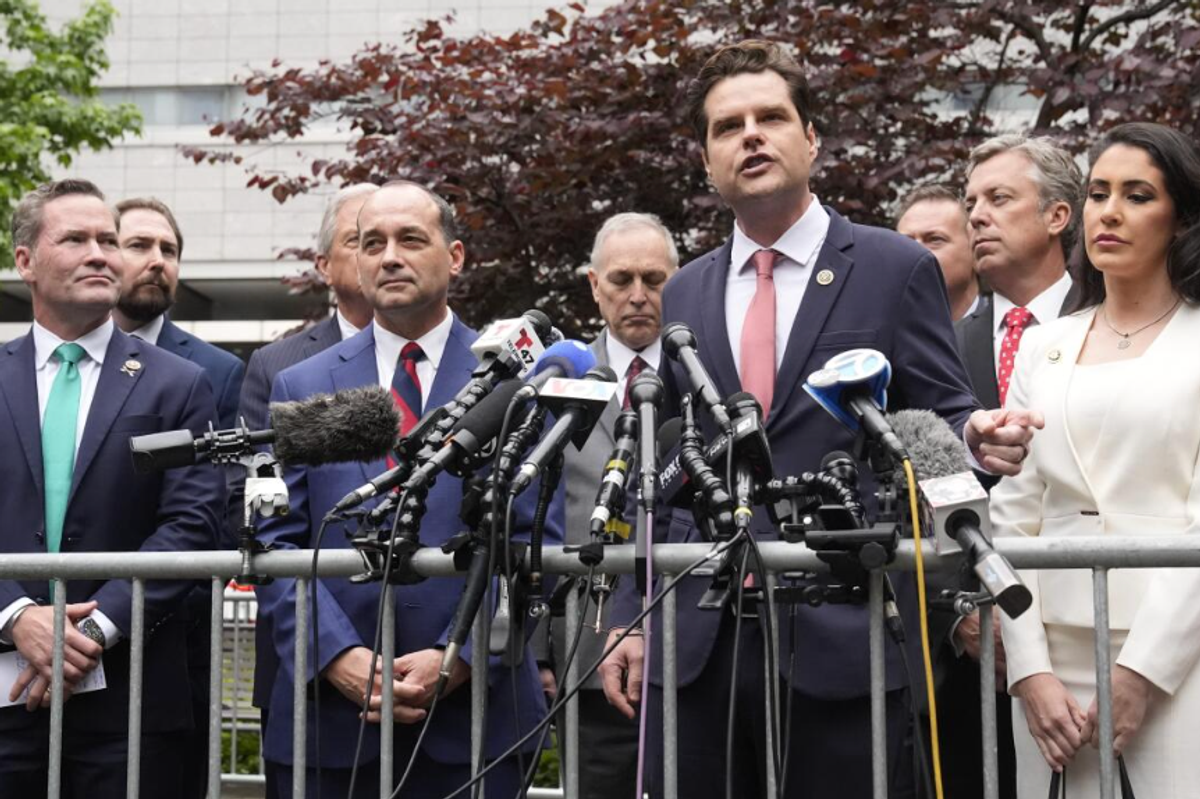Rep. Matt Gaetz outside the New York Supreme Court for Trump trial on May 15, 2024
The first Congressional Gold Medal was struck in 1776 as a way of saying thanks to George Washington. Since then, the medal has been awarded just 184 times to hallowed figures including Mother Teresa, Rosa Parks, Nelson Mandela, and the Dalai Lama. Compared to the 647 civilian Presidential Medals of Freedom or the 3,517 military Medals of Honor, the Congressional Gold Medal is the rarest of the great honors awarded in America.
Naturally, a group of Republicans is angling to present one to Donald Trump.
As Politicoreports, Rep. Anna Paulina Luna of Florida is leading a squad of six Republicans determined to bestow a medal on Trump. Adding to the absurdity, they claim they want to award the medal because of Trump’s “dedication to strengthening America’s diplomatic relations.” Which apparently means threatening to abandon allies, enabling Vladimir Putin, and exchanging “love letters” with Kim Jong Un.
Finding the best way to show obeisance to Donald Trump is every modern Republican’s major obsession. Checking in at Trump’s criminal trial for falsifying documents to hide a sexual encounter with a porn star and protect his candidacy in the 2016 election is the hot new ticket for Republicans hoping to survive the 2024 election—and the purges that would follow a Trump victory.
However, not everyone can blow off a day of work and run to a New York courthouse to help Trump get around his gag order.
Scoring some sweet time in front of Fox News cameras to tell Trump they want to give him the greatest honor Congress can award must sound pretty good to this group of House Republicans, which includes Rep. Lauren Boebert and Chief Deputy Whip Guy Reschenthaler.
They get to talk about Trump’s accomplishments in the field of diplomacy, like that time Trump decided to launch a verbal war on Canada. Or how Trump prepared individual insults for G20 leaders. Or his no-U.S.-translator-allowed meetings with Putin. Or how world support for the U.S. crashed under Trump and rebounded under Joe Biden.
But they know it’s all just pretend. There’s absolutely zero chance that Trump will get a Congressional Gold Medal for his “exceptional leadership.”
That’s because the medal can only be awarded through an act of Congress. Two-thirds of the members on the House Committee on Financial Services and the Senate Committee on Banking, Housing, and Urban Affairs are required to sponsor any proposed recipient before the measure can even make it to the House and Senate floor for a vote. And then the measure has to pass the full House with two-thirds of the vote.
Trump isn’t going to get past square one, and all six of those pushing this little scheme know it. This is just another example of so-called virtue signaling by Republicans—where the only virtue they understand is bolstering Trump's ego.
There is another shiny option Trump can strive for: the Congressional Award Gold Medal, which has been awarded to thousands of Americans. To get one, Trump would only have to do 400 hours of voluntary public service, 200 hours of personal development, 200 hours of physical fitness, and a five-day, four-night expedition or exploration. It sounds unlikely, but Republicans might declare that Trump’s rallies, social media attacks, golf outings, and court time in Manhattan satisfy those requirements.
He would also need to be between 14 and 18 years old. But considering the things Republicans are willing to believe about Trump, that doesn’t seem like an insurmountable problem.
Reprinted with permission from Daily Kos.









